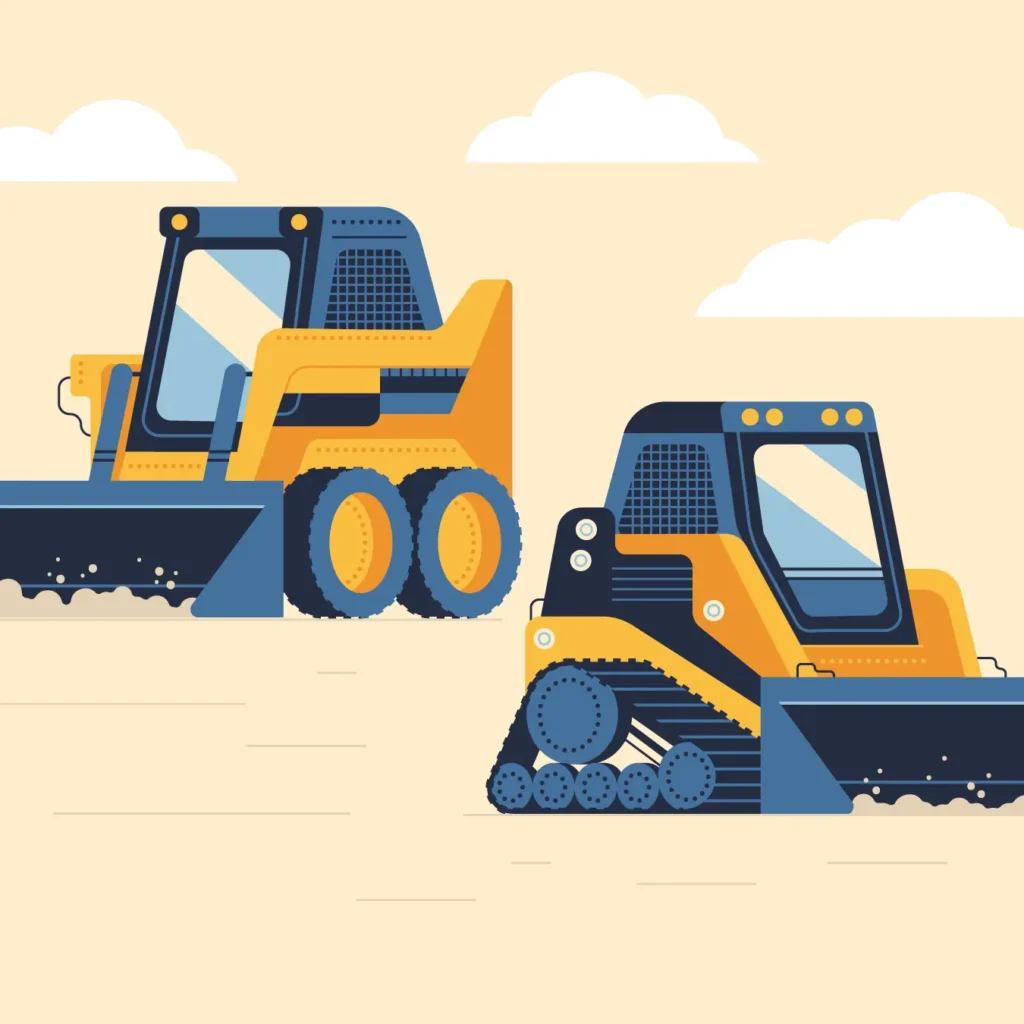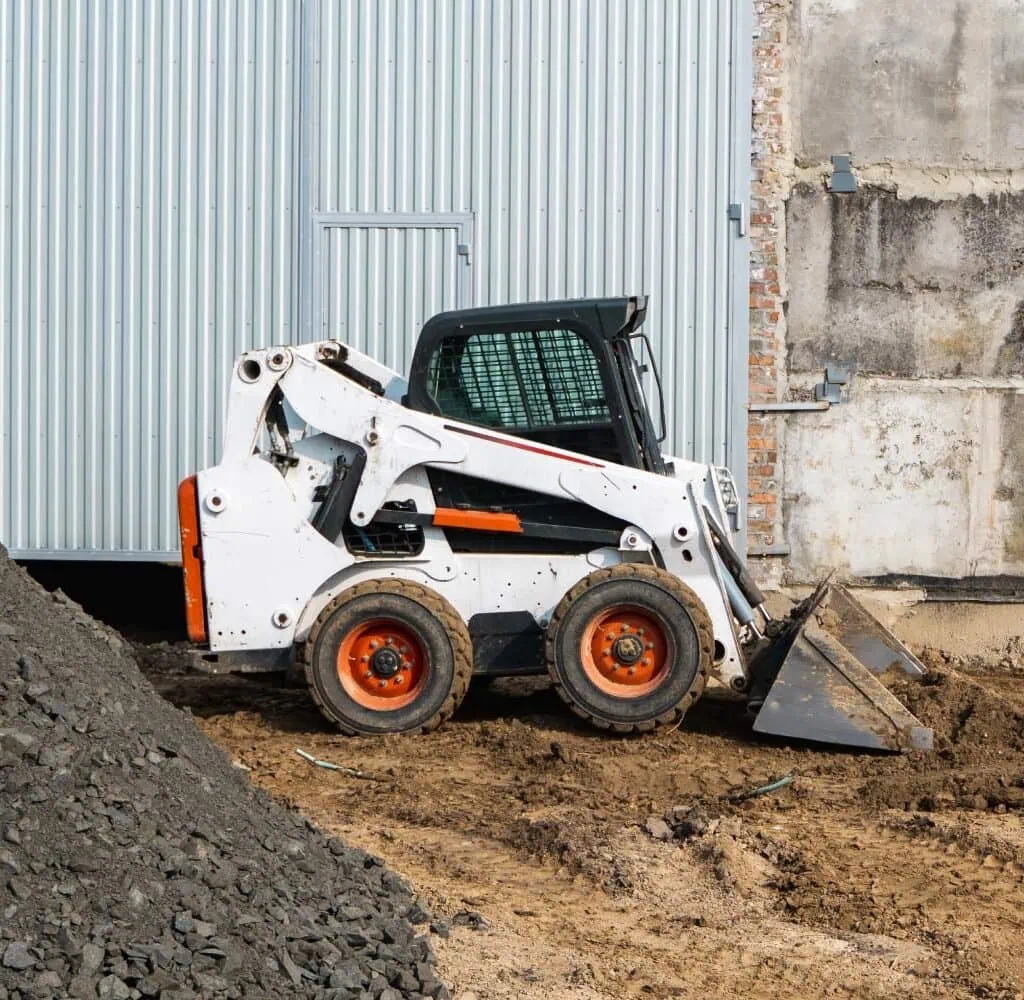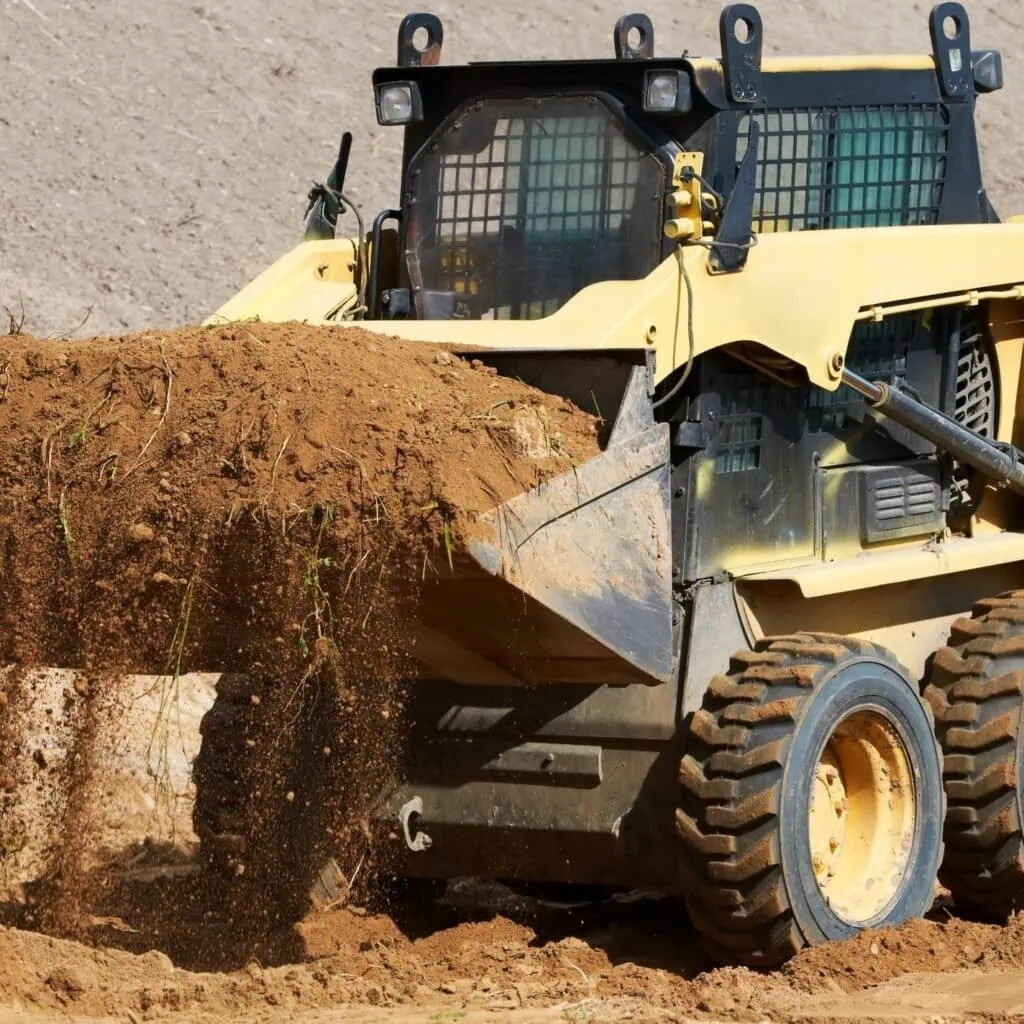When selecting farm equipment, the right skid steer can make all the difference in terms of efficiency and productivity. Among the various types available, a track or wheel skid steer for farm use stands out as one of the most versatile machines for handling a wide range of tasks, from digging and lifting to grading and hauling. However, the question remains: which is the best choice for your farm? A track or wheel skid steer for farm use can have a significant impact on your daily operations. In this article, we’ll explore the advantages and disadvantages of both options to help you decide which is better suited to your farm’s specific needs.
Tabla de contenido
PalancaWhat Is a Skid Steer?
A skid steer is a compact, maneuverable machine used in various industries, but particularly in agriculture. It is often used to carry out tasks such as clearing debris, moving materials, grading, and digging. Skid steers come in two main configurations: track skid steers y wheel skid steers. The choice between a track or wheel skid steer for farm use depends on the type of terrain you’re working with, the tasks you need to complete, and your budget.The key difference between the two lies in the type of wheels or tracks they use, which affects their performance on different terrains.

Track Skid Steer for Farm Use: Advantages
A track skid steer for farm use is equipped with continuous rubber tracks instead of traditional wheels. These tracks provide several unique benefits that make track skid steers ideal for certain farm conditions.
1. Better Traction on Soft or Muddy Ground
One of the key benefits of a track skid steer for farm use is the superior traction it offers. Tracks are designed to distribute the machine’s weight more evenly across a larger surface area. This reduces ground pressure, allowing the machine to grip soft, uneven, or muddy terrain more effectively than a wheel skid steer. In challenging conditions like wet soil or marshy fields, a track skid steer for farm use can perform more reliably and prevent getting stuck.
2.Lower Ground Pressure
Another reason a track skid steer for farm use is often preferred is its lower ground pressure. Tracks spread the weight across a larger surface, which helps to reduce soil compaction. For farmers looking to minimize damage to their fields, especially in sensitive areas like crop rows, a track skid steer for farm use is a wise choice.
3. Reduced Soil Compaction
Another advantage of a track skid steer for farm use is its ability to minimize soil compaction. Since tracks distribute weight more evenly, they are less likely to compact the soil, which can be detrimental to crop growth. If you’re working in fields where maintaining soil health is a priority, choosing a track skid steer for farm use will help you avoid damaging the soil structure, making it easier for plants to thrive.
4. Improved Stability on Rough Terrain
If your farm has uneven or rocky terrain, a track skid steer for farm use will provide better stability. Tracks have more surface contact with the ground, helping the machine stay balanced even in challenging environments. Whether you’re working on hilly terrain, dealing with rocks, or traversing bumpy fields, a track skid steer for farm use is less likely to tip or lose traction.
5. Extended Lifespan in Harsh Conditions
A track skid steer for farm use tends to last longer when exposed to harsh conditions. The rubber tracks are generally more durable than wheels, especially in environments that require frequent operation in wet or muddy conditions. Over time, a track skid steer for farm use will provide better long-term value due to its robust design, especially if your farming activities involve heavy-duty tasks like digging or land clearing.

Wheel Skid Steer for Farm Use: Advantages
While track skid steers for farm use are highly effective in many situations, wheel skid steers for farm use also have distinct advantages that make them a popular choice, especially in certain farming conditions. The wheel skid steer for farm use also has its own set of benefits, particularly when it comes to operating on hard surfaces or in environments that don’t require the extra traction that tracks provide.
1. Faster Speeds and Better Agility
A significant advantage of a wheel skid steer for farm use is its higher speed. Since wheels offer less resistance than tracks, a wheel skid steer for farm use is capable of faster travel across hard surfaces, making it ideal for tasks that require mobility. Whether you need to move from one end of the farm to the other quickly or cover large distances on paved or solid surfaces, a wheel skid steer for farm use will provide better speed and maneuverability.
2. Lower Initial Cost
In terms of upfront costs, a wheel skid steer for farm use is generally less expensive than a track model. While track skid steers for farm use offer superior traction and stability, their added complexity and durability come at a higher price. If your farm doesn’t require the added benefits of a track skid steer for farm use, a wheel skid steer for farm use can offer significant cost savings without compromising on performance for most tasks.
3. Easier Maintenance and Lower Repair Costs
Maintaining a wheel skid steer for farm use is usually more straightforward and less expensive than maintaining a track skid steer for farm use. Tracks can wear out more quickly, especially when used on hard surfaces or in extreme conditions. In contrast, wheels are generally less prone to damage and require fewer repairs. The maintenance process for a wheel skid steer for farm use is often simpler, making it a more practical option for farmers who want to reduce ongoing operating costs.
4. Better Performance on Hard, Dry Surfaces
On farms where the terrain is mostly hard and dry, a wheel skid steer for farm use is often the better choice. Wheels perform better on solid ground and are less likely to create ruts or damage roads and pathways. If you’re mainly working on paved surfaces, gravel roads, or dry fields, a wheel skid steer for farm use will likely be faster and more efficient than a track model.

Factors to Consider When Choosing Between a Track or Wheel Skid Steer for Farm Use
Explore some key considerations to help you make an informed decision.
Choosing between a track or wheel skid steer for farm use ultimately depends on the specific needs of your farm, several factors come into play. Let’s Here are some important factors to consider:
1. Type of Terrain
The terrain of your farm is one of the most important factors to consider when choosing between a track or wheel skid steer for farm use. If your farm is prone to muddy or soft conditions, a track skid steer for farm use is likely your best bet. Tracks provide better flotation and traction in these conditions, preventing the machine from becoming bogged down.
On the other hand, if your farm features mostly dry, solid ground or paved paths, a wheel skid steer for farm use will perform better. Wheels offer greater speed and are less prone to excessive wear and tear when used on hard surfaces.
2. Weather and Soil Conditions
Weather conditions can also impact your decision. A track skid steer for farm use is better equipped to handle wet and rainy conditions, where the ground may become soft and slippery. On the other hand, a wheel skid steer for farm use is ideal for dry and stable soil conditions.
3. Load Capacity and Attachment Use
When deciding between a track or wheel skid steer for farm use, consider the types of tasks you need to accomplish. If you need to lift heavy loads or use attachments like buckets, graders, or augers, a track skid steer for farm use offers better weight distribution and stability. However, if your tasks require less intense lifting or lighter attachments, a wheel skid steer for farm use will provide sufficient power and mobility.
4. Budget and Maintenance Costs
The initial purchase price and ongoing maintenance costs are crucial factors to consider. A wheel skid steer for farm use tends to be less expensive both in terms of initial purchase and long-term maintenance. If budget is a primary concern and your farming needs don’t demand the extra stability and traction of a track skid steer for farm use, opting for a wheel model can save you money.

Conclusión
In conclusion, both track and wheel skid steers for farm use offer distinct advantages, and the best option for your farm depends on the terrain, your operational needs, and your budget. If you need superior traction, stability, and performance on soft or uneven ground, a track skid steer for farm use is the way to go. However, if your farm’s terrain is dry, hard, and flat, and you need a machine that offers speed and easier maintenance, a wheel skid steer for farm use might be the more practical choice.
Ultimately, the decision comes down to understanding the specific challenges of your farm and how the different types of skid steers align with those needs. Whether you choose a track or wheel skid steer for farm use, ensuring that it meets the demands of your farm will help you maximize productivity and efficiency.Contact us for more information.
